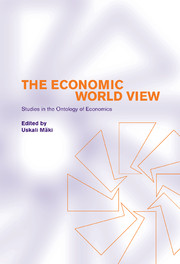Book contents
- Frontmatter
- Contents
- Notes on the contributors
- Preface
- I The what, why, and how of economic ontology
- II Rationality and homo economicus
- Part III Micro, macro, and markets
- 9 Essences and markets
- 10 The metaphysics of microeconomics
- 11 Ontological commitments of evolutionary economics
- 12 Is macroeconomics for real?
- 13 The possibility of economic objectivity
- Part IV The world of economic causes
- Part V Methodological implications of economic ontology
- Name index
- Subject index
13 - The possibility of economic objectivity
Published online by Cambridge University Press: 04 August 2010
- Frontmatter
- Contents
- Notes on the contributors
- Preface
- I The what, why, and how of economic ontology
- II Rationality and homo economicus
- Part III Micro, macro, and markets
- 9 Essences and markets
- 10 The metaphysics of microeconomics
- 11 Ontological commitments of evolutionary economics
- 12 Is macroeconomics for real?
- 13 The possibility of economic objectivity
- Part IV The world of economic causes
- Part V Methodological implications of economic ontology
- Name index
- Subject index
Summary
Among philosophers of science, the phrase ‘positive economics' is apt, these days, to produce snickers. Economists tend to be less embarrassed by the term – Lipsey and Crystal, after all, use the phrase as the title of their bestselling introductory text – but only slightly. In a 1994 paper, Samuel Weston defends the utility of a positive/normative distinction in economics, but in a strikingly tepid way. He concedes the impossibility of ‘a purely positive, that is, value-free or ethically neutral economics' (p. 5), but argues, following Machlup (1969), that economists should preserve the concept of relative normativity in order to encourage self-consciousness about the more overtly ideological influences on their theories and policy recommendations. For Weston, the positive/normative distinction is based on purely pragmatic considerations, and is to be drawn despite the fact that it has no sound epistemological or ontological basis. This sort of defence of the distinction has polemical import only against the most extreme denial of the possibility of objectivity. Such extreme denial, like most forms of philosophical scepticism, must be motivated on the basis of highly general epistemological theses. Engaging it, therefore, is unlikely to turn on any issues that arise from within the practice of economics, or of any other special science. This is illustrated by Weston's own argument, much of which could be applied with only minor amendments to any science that suggests practical advice – which is to say, to any science at all.
In the following discussion, we wish to provide a much stronger defence of the possibility of positive economics, from a perspective that sees the challenges to economic objectivity as arising from, and needing to be answered with regard to, particular problems that arise within economics.
- Type
- Chapter
- Information
- The Economic World ViewStudies in the Ontology of Economics, pp. 246 - 272Publisher: Cambridge University PressPrint publication year: 2001



